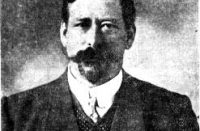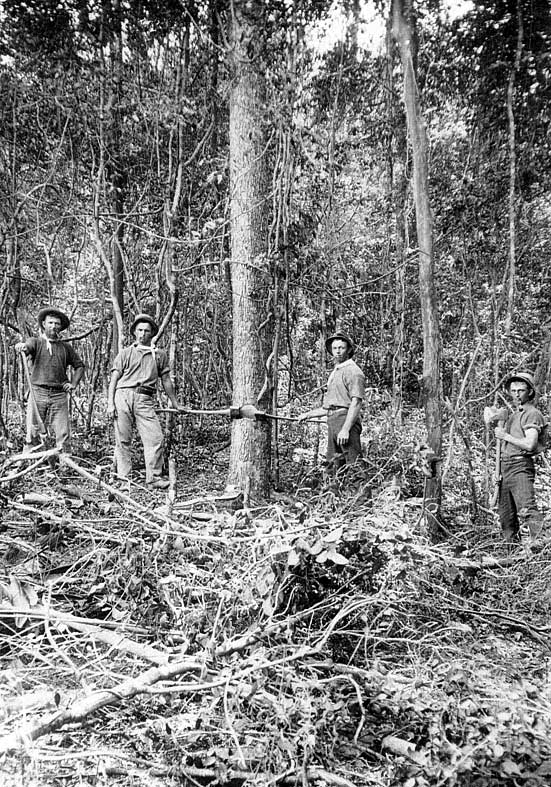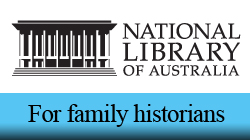THE LUTHERAN -30 May 2005
In Obum Scrub
(This is a photo of the Fassifern Scrub-in the 1890’s – obtained by Mark Schuster)
How one family is working to preserve and restore a part of God’s creation – Aub Podlich
‘To pay attention, this is our endless and proper work.’ (Mary Oliver, poet)
At the heart of my faith glows this core, that ‘my help is in the name of the Lord, who made heaven and earth’ (Psalm 121:2). How do I know this? Because I have lifted up my eyes to the hills. I have seen where my help comes from. I have seen that my heavenly help is earthly. I have learnt to look for him in those ordinary places where he has always declared himself to be: in the work of his hands, and even in mine.
Here is his body, in the people he chose as his own. Pay attention now, or you will miss him. Here in the water of the font he is creating a new person. Here in the labour of our hands, he is the healing concealed in bread and hidden in wine. Here he is, his very self, in the collected fragments of the works of poets, storytellers and letter-writers that we refer to as his word. This is the God who walked in his own garden in the cool of the day. This is the Father who loved his cosmos so much that he gave his only Son. This is the Son who wandered our stony hillsides, breathed air that smelled of fish, and spilt his blood on our dust. This is the great Spirit who infuses his universe with himself. Pay attention now. The vehicles of his presence are so ordinary he is easy to miss. If you lift up your eyes to the hills and don’t hear yourself crying out ‘Hosannah to the Son of David! Blessed is he who comes in the name of the Lord!’ then the hard Obum stones will have to cry out for you!
And so it is that on Monday, my Sabbath, I am sitting on my stump once again in Obum Scrub. My little dog Jellybean is with me, and I am teaching her the words of one of my favourite writers, Chet Raymo, ‘There is a light that burns at the centre of every star, every cell, every living creature, every human heart’, and we are attending to Mary’s Oliver’s ‘endless and proper work’of paying attention, not to the light of the world, who is the invisible God, but to the endless mantles through which he sheds the hint of his presence in the world.
My wife Merrilyn and I bought Obum Scrub five years ago. It is a 43-acre remnant of a degraded and endangered ecosystem, locally called vine scrub, a kind of hard, dry rainforest dominated by brigalow trees, with an understorey of softwoods and a festooning tangle of vines. Linked to our three neighbours’ scrubs, it is possibly the largest remaining remnant of the vast Fassifern and Dugandan Scrubs which once covered many square kilometres of the rolling hills of the Fassifern, an area about a hundred kilometres south-west of Brisbane. We bought the scrub because we believed that what God created through volcanic eruption, weathering and planting should not be left to the lingering death of neglect and over-exploitation. We bought it also because, as Lutherans in this area, these scrubs made us.
The Lutheran churches of the Kalbar-Boonah area began when the state government threw open the ‘useless’ scrublands on the old pastoral runs for closer settlement in 1877 and propagandised thousands of ‘German fools’ to take up selections that others had rejected as too difficult. The Germans, mainly from West Prussia, Pomerania and Brandenburg, were lured by the prospect of owning their own 80-acre blocks, and they streamed out of the port of Hamburg across the seas to Queensland in their thousands. They were people whose prospects in their homelands were so bleak they were prepared to risk everything in incredibly difficult conditions where there were not yet towns or amenities and only the tracks of the Yugarapul people through their ancestral scrub homelands. Many of their descendants are still here. In the space of ten years of hacking, crashing and burning, the Germans cleared the scrubs and converted the area into a patchwork of scrub-soil farms, highly prized today. As they did so, they established eight separate congregations in this general area, three of which remain and form our modern Fassifern Parish.
My grandfather’s grandfather and grandmother were German scrub farmers from the original land rush of 1877. My late father bulldozed the last remnant scrub on our farm sometime around the 1960s. I spent many childhood days exploring the vine scrubs. The scrubs are in my veins. My ancestors carved out their lives there, as did the ancestors of many of my current parishioners. In the scrub I am at home. With these people I am at home.
Obum Scrub has become my place of observation, consolation and inspiration. It is the place where my wife and I obey the imperative of the Creator of the Garden to till the earth and preserve it. Reduced to scattered fragments, scrubs like this one are all we have left of a unique ecosystem created over millennia by a unique God, and they are tiny living links to the lands of our ancestors. It was the German custom to leave a small patch of scrub, usually about five acres, for cattle to winter in and as a source of timber for fence posts, sheds and firewood. After nearly 130 years of exploitation, all the remnant scrubs are in deep trouble, the older trees dead or dying, the seedlings grazed by stock and the remnant smothered by introduced pest vines.
Yet even there, in those cracked clay vessels, the light that burns at the centre of everything that exists still flickers. Our scrub has a hundred different species of trees, shrubs and vines. There are orchids flowering now and tiny wildflowers. There is one species of rare and endangered tree. The black-breasted button quail, whose status is vulnerable and which is rarely seen, is among the 115 bird species we have recorded there. Bandicoots, echidnas, koalas, flying foxes, insectivorous bats and wallabies delight us. The fruits, the flowers and the scrub scents please us. The vine scrubs supply host plants for numerous butterflies; we have 55 on our list. We have made use of many experts in various fields of ecology to help us understand how best to care for the scrub and how best to collect its seeds, grow its trees and extend its borders with locally sourced material. We have planted more than five thousand native trees on what were patches of degraded cultivation. We want to add to the bird-song choir, to the music of trees clapping their hands, to the orchestra of 14 species of frogs, and volcanic lichen-encrusted rocks shouting ‘Hosannah!’ We want to serve our neighbours, whose lowlands have turned to salt through the over-clearing around them which has raised the watertable.
We have a bush picnic area at the scrub, near one of five small dams. Friends come there to camp. School children visit to learn. Field naturalists arrive for outings. We held a parish picnic there, a zone pastors’ family day and countless family gatherings. It is a place to be shared with like-minded people. It has ticks and snakes and stinging and thorny trees, but it is our sacred place. It is my place of consolation and retreat. I am pastor to many of my relatives and childhood friends. Often, before their funerals, I go to the scrub and sit, and I feel myself in the presence of the light that gives life to the world. When the grief of parents who have lost a child, or the lingering dying of a loved parishioner, or the general malaise of this brutal, self-centred, unjust world threatens to overwhelm me, I go back to the scrub. There are things there I can touch and see and hear and smell, things that cannot be detected by the senses but by faith alone.
Obum Obum, the place with the improbable name, is a district near Kalbar. It is said that its Yugarapul meaning is ‘hard stone’. It is a place we own because of a Rock that is higher than we are, a Stone which the builders rejected who has become our Cornerstone. We do many things there, but mostly we just pay attention.




i love your stories in the guardian newspaper and this one about your,s and your wife,s special place.My special place is Binna Burra,its where i feel God,s presence.
Dear pastor Aub. about 10 years ago I received music sheets of a song called A Christmas Blessing and it says that you wrote the words. I am curious: is this text somehow related to a native song or did you newly create it? I love it very much and performed it often in Christmas Concerts. the words go: May God’s feet walk with you and His hand hold you light. etc.
Now I want to perform this song with my Volendam Choir, see website. They wear the traditional Dutch costums and I think it will be a lovely item.
I hope to hear from you. Anyway, we will dedicate it to you and your work as we sing.
Greetings, Marlie Durge, conductor of the Volendam Vocaal Ensemble
Pingback: anthony w blake
Aub, I am a mad keen pohotographer in my eighties and reside at Peak Crossing, and would dearly like to meet up with you, and ask a few questions. My website is not up to date, basically because I do not know how to update it, but my current pictures are far ahead of what you see there, I compete internationally and enjoy every minute of it. You have my respect, and regards, my phone number is 54672319 Many thanks Ken Cooke JP(Qual)
My ancestors were some of the first families to settle in the Fassifern Scrub. They had always left a section of the scrub on their land, but when the proprerty was sold in the 1970s the new owners cleared it all. It is very sad to see the bare hill of where it was. It is good that a small section of scrub has survived and is being cared for.
I have a Cope in my distant past. As well as a lot of Germans from Hiagslea area.